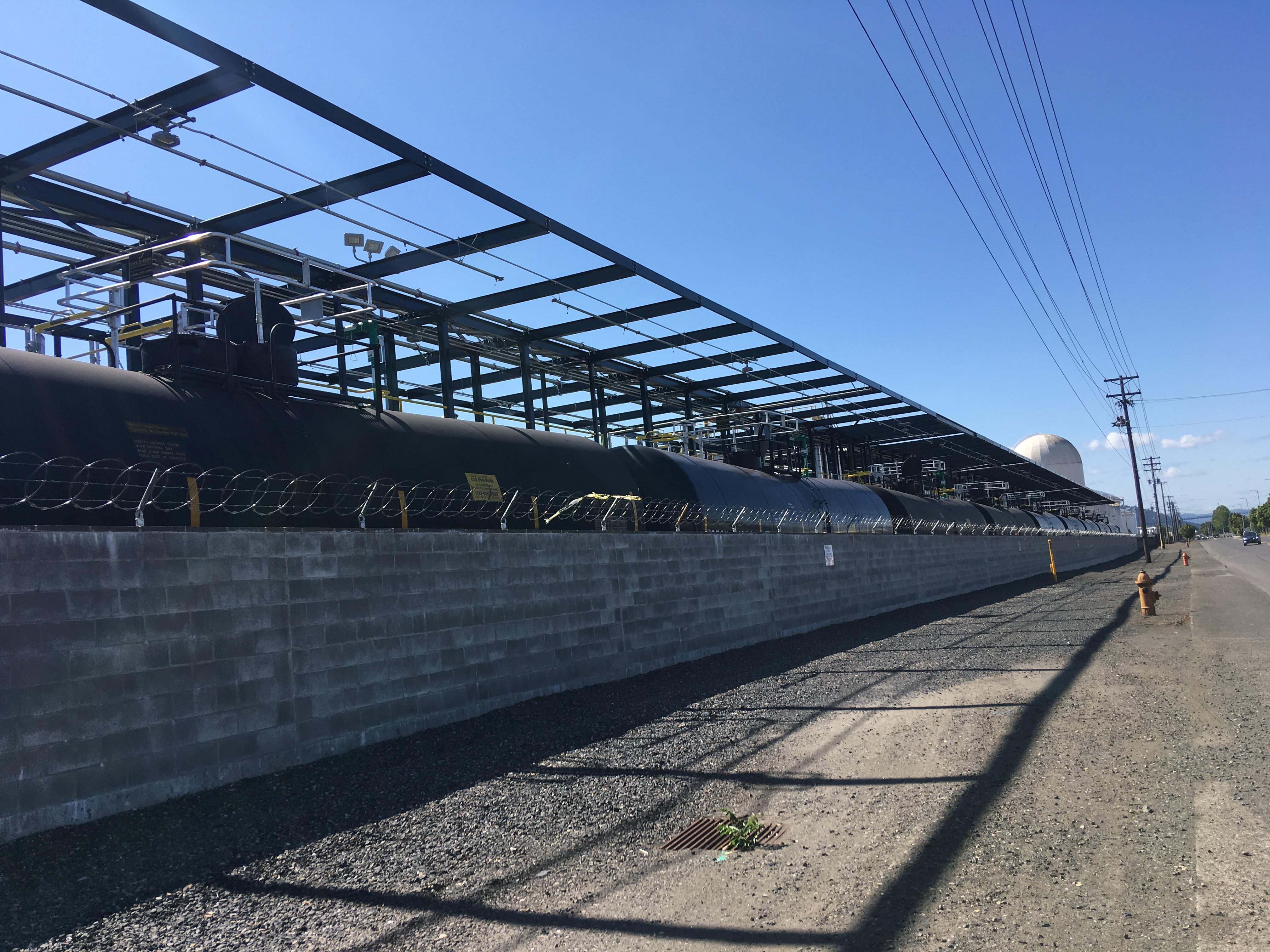
Oil cars line up for unloading at the Zenith Energy oil terminal in Portland's northwest industrial area.
Cassandra Profita / OPB
Oil terminal operator Zenith Energy is taking its land-use dispute with the city of Portland to the Oregon Court of Appeals.
On Thursday, the Texas-based company filed an appeal of a Feb. 3 decision by the Oregon Land Use Board of Appeals, the state’s special tribunal for conflicts over local land-use rulings. LUBA’s decision in the Zenith case allows the city of Portland to strengthen its argument for denying a land-use approval the company needs to continue operating.
Zenith operates a controversial oil-by-rail facility in Portland’s Northwest industrial area that receives crude oil and renewable fuels from trains, stores the fuel in tanks and sends it through pipes to outgoing ships. The company needs a land use compatibility statement from the city in order to renew a state air quality permit that’s required to operate its facility.
Zenith has proposed expanding its facility so it could receive more renewable biofuels, but city officials said the project as a whole is not aligned with its comprehensive plan and the city’s goals to reduce dependence on fossil fuels.
Last year, the Portland Bureau of Development Services refused to issue a land use compatibility statement to Zenith, quashing the company’s proposed terminal expansion and putting its continued operation in jeopardy. As a result of the city’s denial, the Oregon Department of Environmental Quality refused to issue the company the air quality permit it needs.
Zenith appealed the city’s decision to LUBA, saying in a statement that its proposal to transition to renewable fuels is aligned with the city’s 2035 comprehensive plan.
In a ruling earlier this month, LUBA said the city has the power to deny Zenith land use approval, but the city needs more evidence to support its arguments that the project conflicts with existing land-use goals.
Zenith has now appealed that ruling to the Oregon Court of Appeals. The company is still operating on its existing air quality permit while legal challenges are pending.
Environmental groups that have opposed the terminal’s ongoing expansion celebrated LUBA’s decision, saying it affirmed the city’s authority to shut down the Zenith project. Columbia Riverkeeper and Willamette Riverkeeper intervened in the land-use appeal to side with the city.
In a statement, Grady Reamer, vice president of U.S. operations for Zenith, said the company wants to work with the city on a plan to shift away from storing crude oil as it adds more renewable fuels to its terminal operations. He said 20% of the fuels the facility is currently storing are renewable fuels.
“Zenith offered the city a plan that would have eliminated the storage of crude oil,” Reamer said. “With approvals from the city and Oregon Department of Environmental Quality, Zenith Energy can continue to transform its existing Portland fuel terminal to a majority of renewable fuel in just five years combined with the elimination of the storage of crude oil.”
Reamer said Zenith is committed to helping the city meet the energy and climate goals outlined in its 2035 comprehensive plan. But in the meantime, the company is appealing the state land-use board’s decision.
Margaux Weeke, the communications strategist for Portland City Commissioner Dan Ryan, who supervises the city’s Bureau of Development Services, said the city will be preparing a response and can’t take further action on LUBA’s ruling until the appeals court makes a decision on the case.
In a prepared statement, the Portland City Council said its leaders are committed to addressing climate change and reducing dependence on fossil fuels, and they recognize the potential impacts of the fuels at the Zenith terminal.
“It is time to stop kicking our declarations down the road of intention and start acting with the urgency needed at this critical time in history,” the statement said. “We know that the activities carried out at this site and the fossil fuel products being transported have the potential to directly impact tribal territories, cultural resources, and tribal treaty rights.”
Zenith has until March 17 to send a brief to the appeals court detailing its arguments, and the city and environmental groups party to the case have until April 7 to respond.
The court will hear arguments in the case in April and could decide to affirm or change LUBA’s decision. It could also remand the case back to LUBA for further review.



